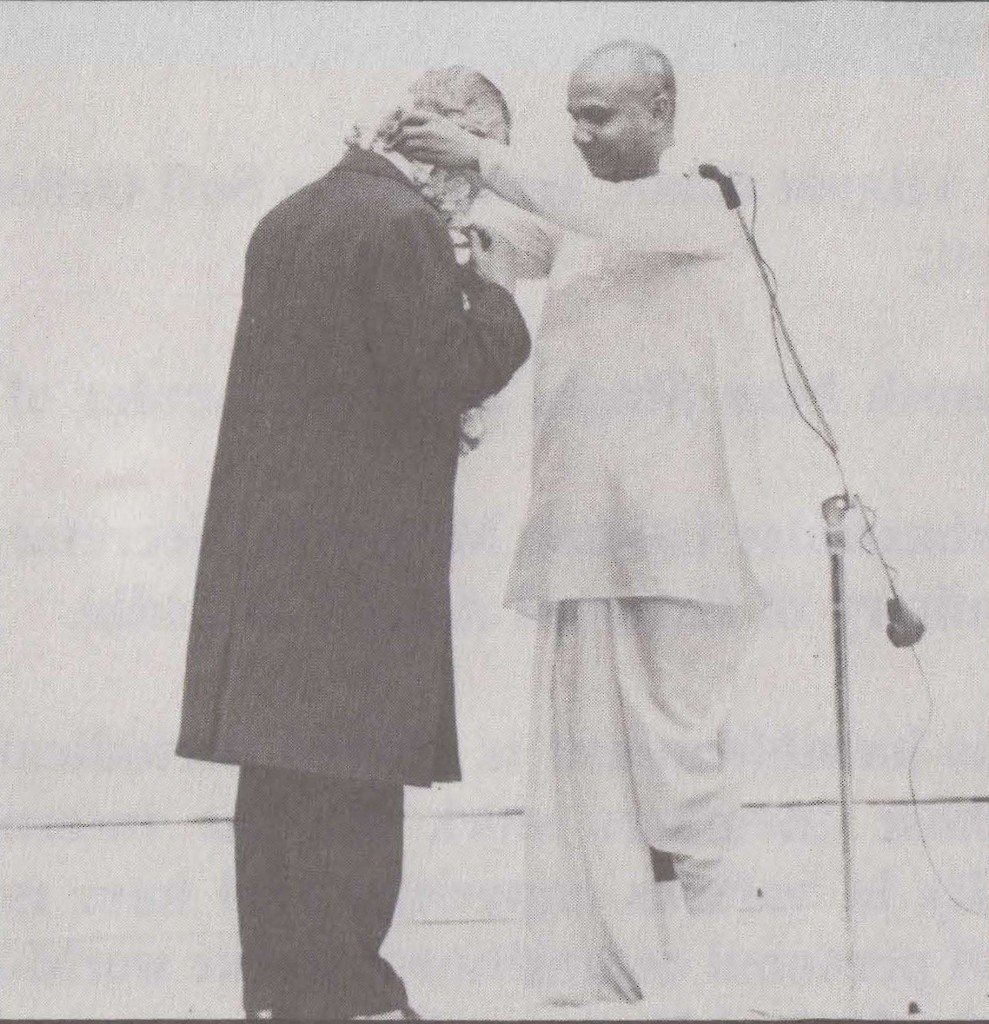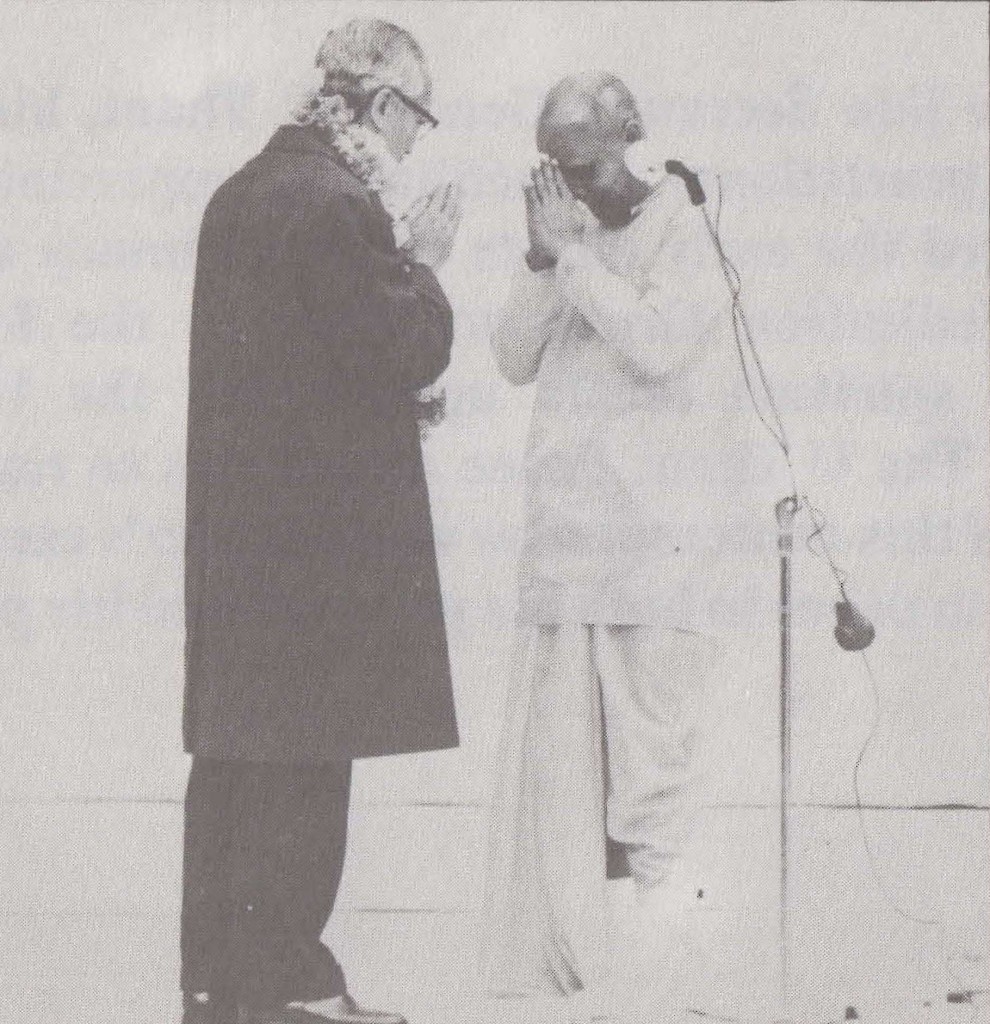Theatrical Performances: Plays on Lives of Spiritual figures from different religious traditions.
Filed under Spiritual figure and plays | Tributes and Expressions of appreciationThe leader of the Peace Meditation at the United Nations , Sri Chinmoy, has been involved with many events supportive of Peace and world harmony, including interfaith initiatives.. He has received encouragement from representatives of many faiths for his leadership and ongoing activities.
One of these activities has been the depiction of the Lives of Spiritual figures from different religious traditions including: The Buddha, Christ and Lord Krishna.
Sri Chinmoy’s insights help illumine the unity of different spiritual traditions around the world.
- The Buddha: U Thant, the third Secretary-General of the United Nations, on 25 May 1973, was guest of honour at the premiere of Sri Chinmoy’s play, Siddhartha Becomes the Buddha. see more at U Thant, Nov 1974(G) Performance “Siddhartha Becomes the Buddha”
First published by Agni Press in 1973.
- In 1973 Sri Chinmoy wrote “The Son”, a play about the Christ, performed in New York and Canada in 1974 at over 30 churches. The Kettledrum Theatre Company of London performed it at the United Nations during an American tour and also throughout Europe. 50 performances of The Son in churches and religious departments of universities in Great Britain. 1975. See some comments at : Oneness-Blessings from the Christian World – 1987 Jun 30
Plays of other religious figures include:
-
The Descent Of The Blue – Sri Aurobindo
-
The Disciple Illumines The Master
-
Drink, Drink My Mother’s Nectar – Sri Ramakrishna
-
The heart of a holy man
-
Lord Gauranga: Love Incarnate
-
Matsyendranath And Gorakshanath: Two Spiritual Lions
-
Mother, Give Me The Light Of Knowledge
-
My Rama Is My All
-
The Sacred Fire
-
Siddhartha Becomes The Buddha
-
The Singer Of The Eternal Beyond – Sri Krishna
-
The Son – The Christ
-
Supreme Sacrifice
Sri Chinmoy also wrote play scenes that showcased lives of inspiring historical figures such as Abraham Lincoln and Thomas Jefferson. Over the Years a number of Acts from these plays were staged for the U.N. Community. See The Sacred Fire by Sri Chinmoy.
First published in 1975
Sri Chinmoy garlands U Thant on 25 May 1973, when he was guest of honour at the premiere of Sri Chinmoy’s play, Siddhartha Becomes the Buddha.
link to S-G U-Thant and Sri Chinmoy at the premier performance and U Thant’s comments: check https://www.srichinmoypeacemeditationatun.org/1974/12/30/meditation-at-un-dedicated-to-u-thant-nov-1974g-performance-%e2%80%9csiddhartha-becomes-buddha%e2%80%9d/
it is extremely difficult to depict the important episodes of the life of the Buddha in the course of a few minutes or an hour or so. But I found that Sri Chinmoy has done a most remarkable job in presenting the play in simple language understandable even to the uninitiated. His stress on the basic characteristics of Buddhism – on compassion, love, renunciation, peace-should stimulate the thoughts of leaders of men and leaders of thought everywhere. As you all aree aware, I was brought up as a Buddhist by tradition, by faith and by practice. And I find myself in complete agreement with Sri Chinmoy in his enunciation of the ethical and moral aspects of Buddhism, which in my view should be the basis for each of us in our search for inner light, in our search for truth.
“Sri Chinmoy in his play also has drawn a very vivid picture of the identity between God and Truth, soul and inner Light, which I very much hope will create an abiding interest in these two great religions-Hinduism and Buddhism-which in many ways constitute the key to all great religions.
I feel very strongly, as some of my friends know, that only by the practical application of the teachings of great religious leaders, particularly the development of the moral and spiritual aspects of life as Sri Chinmoy has stressed in the play-love, compassion, tolerance, the philosophy of live-and let- live, modesty and even humility-that only with this approach, only with this method, will we all be able to fashion the kind of society we want, a truly moral society, a decent society, a livable society, which is the goal of all great religions. “I want to thank particularly those friends who are participating in this play. I wish all of you peace of mind and eternal joy, and particularly the inner joy. Thank you very much, Sri Chinmoy, thank you. Thank you. Thank you. Thank you.”

